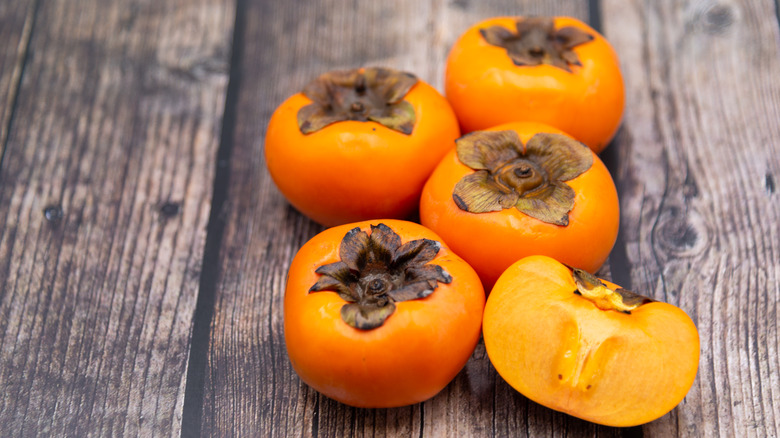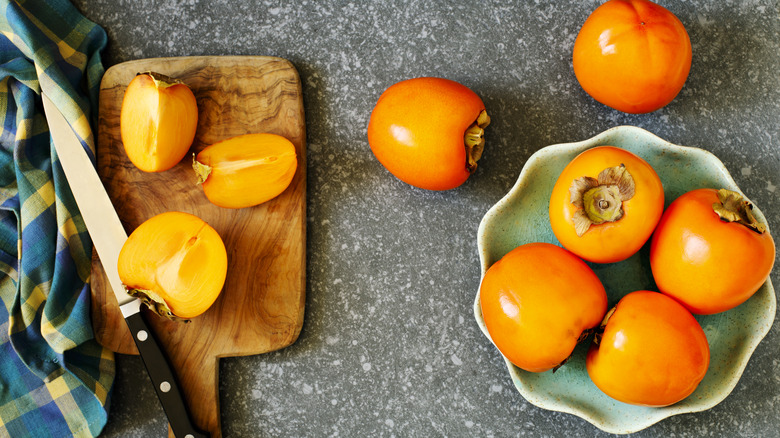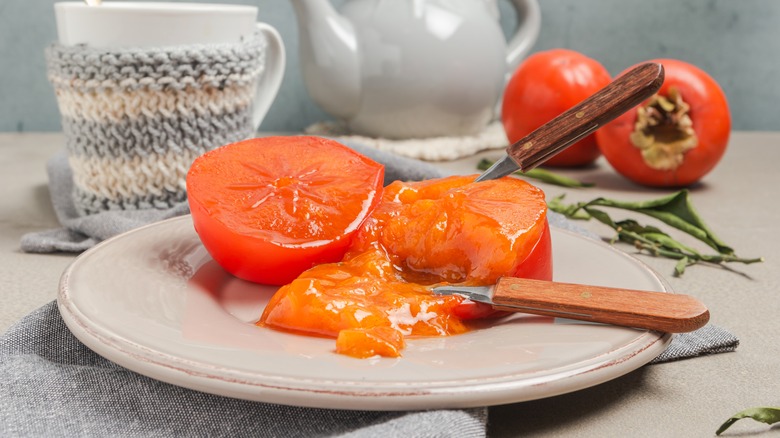How To Tell If A Persimmon Is Ripe
Fall and winter bring with them the wonder of persimmons — those plump, orange-colored fruits that are baked into pies, tossed into salads, turned into sweet jams, or even just eaten alone with a large scoop of ice cream. But you won't truly be able to enjoy this glorious cold-weather fruit if you don't know when it is ripe enough to eat in the first place.
There are several types of persimmons, and they all look slightly different when they ripen. The most common varieties that you will see at supermarkets in the U.S. are the Japanese Fuyu and Hachiya persimmons. Where Fuyus are stout, flat-bottomed, and tomato-shaped fruits, Hachiyas can be identified by their relatively tall and acorn-like shape. Depending on which one you've bought, you'll have to be on the lookout for different signs of ripeness.
For instance, Fuyu persimmons are perfectly ripe even when they are as firm as a crisp apple. This is why it's best to go by their color rather than texture: The pale hue of Fuyu persimmons brightens into a vibrant orange when fully mature.
On the flip side, Hachiya varieties are extremely astringent and unripe when they are firm, so only eat them when they feel soft and squishy under your fingers, like a filled water balloon. If you manage to snag a basket of American persimmons, wait for the fruits to become almost mushy and for their skins to look near-translucent — that's when they are at their ripest and sweetest.
Store your persimmons properly
If your persimmons look like they are a few days away from fully ripening, the best way to store them is to keep them at room temperature, so they can continue maturing. You could even pop them into a brown paper bag with a ripe apple or a banana to speed things up. These fruits emit ethylene gas that, when trapped inside a closed paper bag, can help persimmons mature faster. In fact, it's also the secret to ripening guavas in a flash, and it's the best way to quickly ripen fresh peaches too.
Once the persimmons are mature, transfer them into a refrigerator if you aren't ready to eat them immediately. This will keep them from over-ripening and rotting too quickly. However, make sure to store them in the crisper drawer of your fridge, and do what you can to avoid moisture. If kept cold and dry, most varieties of whole, ripe persimmons will last for at least a few weeks in the fridge — with the exception of Hachiyas, which will only last for one.
If that's not enough time to eat the sweet golden fruits, consider freezing them instead. This will keep them fresh for up to three months. Once you've peeled and deseeded the persimmons, you can either slice them or turn them into a puree for freezing. You could even squeeze some citrus juice on top, so they don't turn brown in there.
What to do with all those ripe persimmons
One of the simplest ways to enjoy a ripe persimmon is to eat it raw. You can bite into crisp Fuyus as they are — just as you would an apple — or peel off their skins if you don't care much for their fibrous texture. On the flip side, the skins of Hachiyas are rather bitter and best avoided entirely.
You can either slice the fruit into half and scoop out its gelatinous flesh like an avocado, or chop off the top and spoon it out the pulp like a kiwi. Alternatively, you could freeze an entire ripe Hachiya and take it out a few minutes before you're ready to eat it. Slice the top off and you'll find that the pulp inside has frozen into a delicious sorbet-like consistency.
Persimmons are equally delightful when cooked. Hachiyas are soft and tender enough to be easily pureed and added to things like ice creams, cakes, and puddings, or turned into jams and preserves. You can even blend them into a persimmon fizz cocktail.
The same goes for American persimmons: The succulent fruits are best added to any dish where the fruit needs to be mashed. Fuyu persimmons, on the other hand, are quite firm and shine in recipes where their texture can be an advantage. Consider chopping it into salads, poaching it, or even roasting it to provide a fruity contrast to rich meats — there are so many delicious possibilities!



